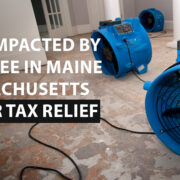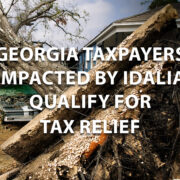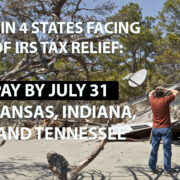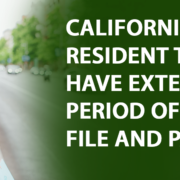President Biden Signs Into Law Expanded Federal Disaster Tax Relief
President Biden Signs Into Law Expanded Federal Disaster Tax Relief
On December 12, 2024 President Joe Biden signed H.R. 5863, the “Federal Disaster Tax Relief Act of 2023” which will designate a series of presidentially declared disasters as qualified disaster events. What this means – if you were impacted by recent hurricanes, you can now claim disaster-related losses more easily—whether you itemize your taxes or not. Settlements for disaster victims are now tax-free, and the burdensome 10% AGI threshold has been eliminated.
The legislation designates that Hurricane Ian and other hurricanes including Hurricanes Idalia, Nicole, Fiona, Debby, Helene, and Milton should be treated as qualified disaster events for purposes of determining the tax treatment of certain disaster-related personal casualty losses. It also includes Fire Victim Trust claimants in Northern California and elsewhere (encompasses a disaster declared after 2014 as a result of a forest or range fire) and those affected by the train derailment in East Palestine, Ohio that occurred on February 3, 2023.
The legislation will also cover any potential major disasters occurring up to 6 months after the President’s signature.
Extended Filing and Payment Deadlines Announced By IRS Still Remain In Place
The most recent announcement being made by IRS on October 25, 2024 where the IRS announced tax relief for individuals and businesses in the Juneau area of Alaska, affected by flooding that began on August 5, 2024. These taxpayers now have until May 1, 2025, to file various federal individual and business tax returns and make tax payments.
The tax relief postpones various tax filing and payment deadlines that occurred from August 5, 2024, through May 1, 2025 (postponement period). As a result, affected individuals and businesses will have until May 1, 2025, to file returns and pay any taxes that were originally due during this period.
This means, for example, that the May 1, 2025, deadline will now apply to:
- Any individual or business that has a 2024 return normally due during March or April 2025.
- Any individual, business or tax-exempt organization that has a valid extension to file their 2023 federal return. However, that payments on these returns are not eligible for the extra time because they were due last spring before the flooding occurred.
- 2024 quarterly estimated income tax payments normally due on September 16, 2024, January 15, 2025, and 2025 estimated tax payments normally due on April 15, 2025.
- Quarterly payroll and excise tax returns normally due on October 31, 2024, and January 31, 2025 and April 30, 2025.
In addition, penalties for failing to make payroll and excise tax deposits due on or after August 5, 2024, and before August 20, 2024, will be abated, as long as the deposits were made by August 20, 2024.
Other Areas Having Extended Deadlines:
The IRS announced (Kentucky) announced (West Virginia) on May 31, 2024 tax relief for individuals and businesses affected by severe storms, straight-line winds, tornadoes, flooding, landslides and mudslides that began on April 2, 2024 in Kentucky and West Virginia now have until November 1, 2024, to file various federal individual and business tax returns and make tax payments.
The IRS announced on August 12, 2024 tax relief for individuals and businesses in 25 Minnesota counties affected by severe storms and flooding that began on June 16, 2024 now have until February 3, 2025, to file various federal individual and business tax returns and make tax payments.
The IRS announced on August 9, 2024 tax relief for individuals and businesses in four states (South Carolina, Florida, North Carolina and Georgia) and on August 13, 2024 the IRS announced tax relief for individuals and businesses in the state of Vermont affected by Hurricane Debby now have until February 3, 2025, to file various federal individual and business tax returns and make tax payments.
The IRS announced on August 23, 2024 tax relief for individuals and businesses in Puerto Rico affected by Tropical Storm Ernesto that began on August 13, 2024 now have until February 3, 2025, to file various federal individual and business tax returns and make tax payments.
The IRS announced on August 23, 2024 tax relief for individuals and businesses in South Dakota affected severe storms, straight-line winds and flooding that began on June 16, 2024 now have until February 3, 2025, to file various federal individual and business tax returns and make tax payments.
The IRS announced on August 28, 2024 tax relief for individuals and businesses in the U.S. Virgin Islands affected Tropical Storm Ernesto that began on August 13, 2024 now have until February 3, 2025, to file various federal individual and business tax returns and make tax payments.
The IRS announced on September 10, 2024 tax relief for individuals and businesses in Connecticut and New York affected by severe storms and flooding from torrential rainfalls that began on August 18, 2024 now have until February 3, 2025, to file various federal individual and business tax returns and make tax payments.
The IRS announced on September 13, 2024 tax relief for individuals and businesses in Louisiana affected by Tropical Storm Francine that began on September 10, 2024 now have until February 3, 2025, to file various federal individual and business tax returns and make tax payments.
The IRS announced on September 18, 2024 tax relief for individuals and businesses in Pennsylvania affected by Tropical Storm Debby now have until February 3, 2025, to file various federal individual and business tax returns and make tax payments.
The IRS announced on October 1, 2024 tax relief for individuals and businesses in parts of Illinois affected by severe storms, tornadoes, straight-line winds and flooding that began on July 13, 2024 now have until February 3, 2025, to file various federal individual and business tax returns and make tax payments.
The IRS announced on October 1, 2024 tax relief for individuals and businesses affected by Hurricane Helene, including the entire states of Alabama, Georgia, North Carolina and South Carolina and parts of Florida, Tennessee and Virginia now have until May 1, 2025, to file various federal individual and business tax returns and make tax payments.
The IRS announced on October 3, 2024 tax relief for individuals and businesses affected by wildfires that began on June 22, 2024 to the Confederated Tribes and Bands of the Yakama Nation in Washington state now have February 3, 2025, to file various federal individual and business tax returns and make tax payments.
The IRS announced on October 11, 2024 tax relief for individuals and businesses affected by wildfires that began on July 10, 2024 to the San Carlos Apache Tribe in the State of Arizona now have February 3, 2025, to file various federal individual and business tax returns and make tax payments.
The IRS announced on October 11, 2024 tax relief for individuals and businesses affected by Hurricane Milton, including the entire states of Alabama, Georgia, North Carolina and South Carolina and parts of Florida, Tennessee and Virginia now have until May 1, 2025, to file various federal individual and business tax returns and make tax payments.
IRS Tax Relief Details
The IRS is offering this relief to any area designated by the Federal Emergency Management Agency (FEMA), as qualifying for individual assistance.
For Alaska – Individuals and households that reside or have a business in the Juneau area.
For Arizona – Individuals and households that reside or have a business in the San Carlos Apache Tribe.
For Alabama, Georgia, North Carolina and South Carolina – Individuals and households that reside or have a business in the state.
For Florida – Individuals and households that reside or have a business in the state.
For Tennessee – Individuals and households that reside or have a business in the following 8 counties: Carter, Cocke, Greene, Hamblen, Hawkins, Johnson, Unicoi and Washington counties.
For Virginia – Individuals and households that reside or have a business in the following 6 counties: Grayson, Smyth, Tazewell, Washington, Wise and Wythe counties; and the City of Galax.
For Washington State – Individuals and households that reside or have a business in Confederated Tribes and Bands of the Yakama Nation.
For Illinois – Individuals and households that reside or have a business in Cook, Fulton, Henry, St. Clair, Washington, Will and Winnebago counties
For Pennsylvania – Individuals and households that reside or have a business in Lycoming, Potter, Tioga and Union counties.
For Louisiana – Individuals and households that reside or have a business in the entire state.
For Connecticut – Individuals and households that reside or have a business in Fairfield, Litchfield, and New Haven counties.
For New York – Individuals and households that reside or have a business in Suffolk County.
For the U.S. Virgin Islands – Individuals and households that reside or have a business in any of the U.S. Virgin Islands’ four islands.
For South Dakota – Individuals and households that reside or have a business in Aurora, Bennett, Bon Homme, Brule, Buffalo, Charles Mix, Clay, Davison, Douglas, Gregory, Hand, Hanson, Hutchinson, Jackson, Lake, Lincoln, McCook, Miner, Minnehaha, Moody, Sanborn, Tripp, Turner, Union and Yankton counties
For Puerto Rico – Individuals and households that reside or have a business in any of Puerto Rico’s 78 municipalities.
For Minnesota – Individuals and households that reside or have a business in Blue Earth, Carver, Cass, Cook, Cottonwood, Faribault, Fillmore, Freeborn, Goodhue, Itasca, Jackson, Lake, Le Sueur, Mower, Murray, Nicollet, Nobles, Pipestone, Rice, Rock, St. Louis, Steele, Wabasha, Waseca and Watonwan counties.
For North Carolina – Individuals and businesses and the following 66 counties: Alamance, Anson, Beaufort, Bertie, Bladen , Brunswick, Camden, Carteret, Caswell, Chatham, Chowan, Columbus, Craven, Cumberland, Currituck, Dare, Davie, Davidson, Duplin, Durham, Edgecombe, Forsyth, Franklin, Gates, Granville, Greene, Guilford, Halifax, Harnett, Hertford, Hoke, Hyde, Johnston, Jones, Lee, Lenoir, Martin, Montgomery, Moore, Nash, New Hanover, Northampton, Onslow, Orange, Pamlico, Pasquotank, Pender, Perquimans, Person, Pitt, Randolph, Richmond, Robeson, Rockingham, Sampson, Scotland, Stokes, Surry, Tyrrell, Vance, Wake, Warren, Washington, Wayne, Wilson and Yadkin.
For South Carolina – Individuals and businesses in all 46 counties.
For Georgia – Individuals and businesses in the following 55 counties: Appling, Atkinson, Bacon, Ben Hill, Berrien, Brantley, Brooks, Bryan, Bulloch, Burke, Camden, Candler, Charlton, Chatham, Clinch, Coffee, Colquitt, Cook, Crisp, Decatur, Dodge, Echols, Effingham, Emanuel, Evans, Glynn, Grady, Irwin, Jeff Davis, Jefferson, Jenkins, Johnson, Lanier, Laurens, Liberty, Long, Lowndes, McIntosh, Mitchell, Montgomery, Pierce, Richmond, Screven, Tattnall, Telfair, Thomas, Tift, Toombs, Treutlen, Turner, Ware, Wayne, Wheeler, Wilcox and Worth.
For Vermont – Individuals and businesses in all 14 counties.
For Kentucky – Currently, relief is available to affected taxpayers who live or have a business in Boyd, Carter, Fayette, Greenup, Henry, Jefferson, Jessamine, Mason, Oldham, Union and Whitley counties.
For West Virginia – Currently, relief is available to affected taxpayers who live or have a business in Boone, Brooke, Cabell, Fayette, Hancock, Kanawha, Lincoln, Marshall, Nicholas, Ohio, Preston, Putnam, Tyler, Wayne and Wetzel counties.
The current list of eligible localities is always available on the disaster relief page on IRS.gov. The declaration permits the IRS to postpone certain deadlines for taxpayers who reside or have a business in the disaster area.
Tax Planning Tip
Individuals and businesses in a federally declared disaster area who suffered uninsured or unreimbursed disaster-related losses can choose to claim them on either the return for the year the loss occurred (in this instance, the 2024 return normally filed next year), or the return for the current year (2023).
Be sure to write the FEMA declaration number on any return claiming a loss. That number being: “4782-DR“ for Kentucky or “4783-DR” for West Virginia or “3605-EM” for Florida or “3606-EM” for South Carolina or “3607-EM” for Georgia or “3608-EM” for North Carolina or “3609-EM” for Vermont or “4797-DR” for Minnesota or “3610-EM” for Puerto Rico or “4807-DR” for South Dakota or “3611-EM” for the U.S. Virgin Islands or “3612-EM” for Connecticut or “3613-EM” for New York or “3614-EM” for Louisiana or “4815-DR” for Pennsylvania or “4819-DR” for Illinois or “3615-EM” for Hurricane Helene victims or “4823-DR” for Washington State or “3622-EM” for Hurricane Milton victims or “4833-DR” for Arizona or “4836-DR” for Alaska.
Qualified disaster relief payments are generally excluded from gross income. In general, this means that affected taxpayers can exclude from their gross income amounts received from a government agency for reasonable and necessary personal, family, living or funeral expenses, as well as for the repair or rehabilitation of their home, or for the repair or replacement of its contents.
Additional relief may be available to affected taxpayers who participate in a retirement plan or individual retirement arrangement (IRA). For example, a taxpayer may be eligible to take a special disaster distribution that would not be subject to the additional 10% early distribution tax and allows the taxpayer to spread the income over three years. Taxpayers may also be eligible to make a hardship withdrawal. Each plan or IRA has specific rules and guidance for their participants to follow.
Importance To Preserve Records
Keep in mind that the IRS has up to three years to select a tax return for audit. The FTB has up to four years to select a tax return for audit. In some cases this period is extended to six years. When a taxpayer is selected for audit, the taxpayer has the burden of proof to show that expenses claimed are properly deductible. Having the evidence handy and organized makes meeting this burden of proof much easier.
Essential Records to Have for a Tax Audit
If you are getting ready for a tax audit, one of the most important things to do is gather and organize your tax records and receipts. There’s a good chance that you have a large amount of documents and receipts in your possession. No matter how organized you are, it can be a daunting task to collect the right pieces and make sure that you have them organized and handy for the audit conference.
We have seen many tax audits that hinge on whether or not the taxpayer can provide proper documentation for their previous tax filings. A tax lawyer in Orange County or elsewhere can make sure that the documentation is complete and proper. By submitting this to your tax attorney in advance of the audit, your tax attorney can review your documentation and determine if there are any gaps that need to be addressed before starting the dialogue with the IRS agent.
So what are the most essential tax records to have ahead of your audit? Here are a few must-have items:
- Any W-2 forms from the previous year. This can include documents from full-time and part-time work, large casino and lottery winnings and more.
- Form 1098 records from your bank or lender on mortgage interest paid from the previous year.
- Records of any miscellaneous money you earned and reported to the IRS including work done as an independent contractor or freelancer, interest from savings accounts and stock dividends.
- Written letters from charities confirming your monetary donations from the previous year.
- Receipts for business expenses you claimed.
- Mileage Logs for business use of vehicle.
- Entertainment and Travel Logs for business
Tips On Reconstructing Records
Reconstructing records after a disaster is important for several reasons including insurance reimbursement and taxes. Most importantly, records can help people prove their disaster-related losses. More accurately estimated losses can help people get more recovery assistance like loans or grants.
Whether it’s personal or business property that has been lost or destroyed, here are some steps that can help people reconstruct important records.
Tax records
Get free tax return transcripts immediately using the Get Transcript on IRS.gov or through the IRS2Go app. Tax return transcripts show line-by-line the entries made on your Federal income tax returns. The most three recent tax years are available.
Financial statements
People can gather past statements from their credit card company or bank. These records may be available online. People can also contact their bank to get paper copies of these statements.
Property records
- To get documents related to property, homeowners can contact the title company, escrow company or bank that handled the purchase of their home or other property.
- Taxpayers who made home improvements can get in touch with the contractors who did the work and ask for statements to verify the work and cost. They can also get written descriptions from friends and relatives who saw the house before and after any improvements.
- For inherited property, taxpayers can check court records for probate values. If a trust or estate existed, taxpayers can contact the attorney who handled the trust.
- When no other records are available, people should check the county assessor’s office for old records that might address the value of the property.
- Car owners can research the current fair-market value for most vehicles. Resources are available online and at most libraries. These include Kelley’s Blue Book, the National Automobile Dealers Association and Edmunds.
Develop And Implement Your Backup Plan
Do not wait for the next disaster to come for then it may be too late to retrieve your important records for a tax audit or for that matter any legal or business matter. And if you do get selected for audit and do not have all the records to support what was claimed on your tax returns, you should contact an experienced tax attorney who can argue the application of your facts and circumstances to pursue the least possible changes in an audit.
The tax attorneys at the Law Offices Of Jeffrey B. Kahn, P.C. located in Orange County (Irvine), Los Angeles and elsewhere in California are highly skilled in handling tax matters and can effectively represent at all levels with the IRS and State Tax Agencies including criminal tax investigations and attempted prosecutions, undisclosed foreign bank accounts and other foreign assets, and unreported foreign income. Also if you are involved in cannabis, check out what a cannabis tax attorney can do for you. And if you are involved in cryptocurrency, check out what a bitcoin tax attorney can do for you.











 Follow
Follow Follow
Follow